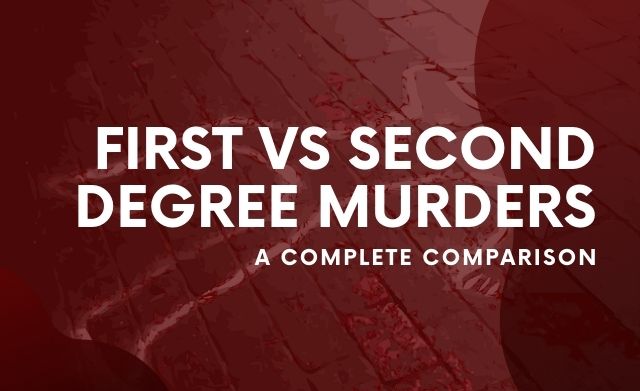
A premeditated homicide requires a plan designed for a certain period. The basic difference between first and second degree murders is in premeditation.
The term homicide involves lawful and unlawful both types of killings. State laws have classified homicide into several categories. First, second and third-degree murders are some unlawful killings considered serious criminal acts in the statutes.
Generally, first-degree murder is a form of murder that is willful, deliberate, and premeditated. On the contrary, the second-degree murder is intentional but not planned before.
Table of Contents
Comparison chart
| Difference | First-degree murder | Second-degree murder |
| Definition | A murder carried out by lying in wait, pre-planned and intentional is first-degree murder. | A murder committed intentionally but not planned before is second-degree murder. |
| Premeditation | Premeditated | Not premeditated |
| Elements | Willful, deliberate, premeditated. | Intentional, reckless disregard, not premeditated. |
| Types | Premeditated, murder by specific means, felony murder. | Depraved heart murder, felony murder. |
| Sentence | Paganism is ancient. | Up to death sentence. |
First degree murder definition
Every murder that is carried out through lying in wait, torturing, poisoning, or by other premeditated intentions is demonstrated as a first-degree murder under the provision of law.
First-degree murder is defined as the most serious of all homicidal offenses. However, the term homicide refers to both non-criminal and criminal acts. First-degree murder and felony murder are two acts under the criminal law of the USA.
Elements of first degree murder
It requires certain elements for a prosecution to demonstrate any murder as first-degree murder. These elements are:
- Willful
- Deliberate
- and premeditation
Willful refers to having particular intent. A murder committed with a specific intention is regarded as first-degree murder. The word deliberate and premeditated refer to a murder that is cool-headed or planned for a while to conduct.
Types of first degree murders
In most states’ statutes, first-degree murder is the highest degree of all crimes. A murder that is premeditated, or committed by specific means, or felony murder, is considered a first-degree offense.
Premeditated murder
Under the first-degree murder statute, premeditated murder is considered a predominant form of killing. Any murder that is pre-planned, willful, and deliberate is a premeditated one. According to the definition, a crime that is committed intentionally, rationally, and with malice causing the death of another person is defined as premeditated murder.
Murder by specific means
A Murder that is carried out by extremely heinous specific methods such as shooting, bombing, using mass destructive weapons, poisoning, torturing, or lying in wait is murder by specific means. Most US states list these types of killings under the first-degree murder statutes.
Felony Murder
Any killing committed by specific violent acts like kidnapping, robbery, rape, burglary, or arson is considered felony murder. Felony murder can even occur accidentally. In some states of the USA, felony murder is added to the sections of first-degree murder.
However, it is not always necessary that all first-degree murders need to have typical elements like premeditation or deliberateness. Along with felony murders, state laws often deem specific types of murders as first degree. These are :
- The killing of a child using unnecessary force
- A murder that has a pattern of domestic abuse
- The killing of a law enforcement officer (such as a police officer) or law personnel
First degree murder sentences
Sentences for first-degree murders vary from state to state. Most of the state statutes draw the harshest punishment for any first-degree crime. In states like Florida or California, the convicted receives a death penalty or life sentence without parole.
For a murder that has no aggravating factors, the accused receives imprisonment for a certain period. In New York or California, the punishment for such killing is up to 25 years imprisonment.

Second degree murder definition
Generally, second-degree murder is a murder that has a trace of intent to kill but lacks premeditation or deliberateness.
According to the legal definition, a killing that is non-preplanned but resulting from a vicious crime like rape, arson, robbery, kidnapping, etc., is considered second-degree murder.
However, the crimes that are demonstrated as second-degree murder in some states’ statutes can fall under the rules of first-degree murders too. Typically, second-degree murder is not committed from aforethought malice in most of the cases. In terms of proving a second-degree murder, the prosecution has to prove that the accused specifically intended to kill, and it was not an accident. In some states, second-degree murder encompasses depraved-heart murder: a killing caused by an unheeding assault for human life.
Elements of second degree murder
The prosecution has to scrutinize the elements in order to indicate the degree of the crime. Either first or second, both degrees of murders are defined based on certain elements. Some elements of second-degree murders are :
- Whether the murder was premeditated or not
- Was the killing committed impulsively, or was it just an accident?
- Was the killing committed with reckless disregard or not
Types of second degree murders
A number of states categorize depraved-heart murder and felony murder as second-degree murder.
Depraved heart murder
A form of murder caused by a willful, reckless act that resulted in death is defined as depraved-heart murder. The depraved heart murder, aka ‘depraved-indifference,’ does not necessarily mean that the accused had an intention to kill but had a will to cause physical harm.
Felony murder
Types of murders vary from state to state; felony murder is deemed as a category of the first or second degree, depending on different state laws. States like Wisconsin, Connecticut, or Maine considers felony as a special category of homicide.
Second degree murder sentences
Second-degree murder is not subject to a death sentence, as it is considered a lesser crime than first-degree murder.
The sentence drawn for second-degree murder varies from state to state. In Arizona, the sentence for the accused may go up to at least ten years of imprisonment. While In California, the convict receives anywhere between 15 years imprisonment to life sentence for the same sort of crime.
In many states, if the defendant is proven to be involved in any aggregative act like killing a law enforcement officer may receive a more serious conviction.
The key differences between First and Second Degree Murders
- The core difference between first and second degree murders is that the first degree of murder is premeditated. In contrast, second-degree murder is not premeditated.
- Some elements of first-degree murder are willful, deliberate, premeditation. On the other hand, some elements of second-degree murder are reckless disregard, not premeditated, and intentional.
- Premeditated, murder by specific means, felony murder are some types of first-degree murder. Some states deem depraved-indifference, felony murder as categories of second-degree murder.
- First-degree murder is the most severe crime according to state law. Second-degree murder is a lesser crime compared to first-degree crime.
- The sentence for first-degree murder may range up to the death penalty. In contrast, second-degree murder is not subject to a death sentence.
Third degree murder or manslaughter
Third-degree murder or manslaughter is deemed as an unlawful homicide according to most of the states’ statutes. A murder that is not premeditated or neither had an intention to kill is categorized as a third-degree murder under the provisions of law.
There are two types of manslaughters: voluntary manslaughter and involuntary manslaughter. Manslaughter may involve a non-violent act that does not lie under the specific categories of felony murder.
The sentence for third-degree murder is not as harsh as first or second-degree murder. Based on different states, the conviction for third-degree murder may range from 5 years to 15 years imprisonment or a specific cash penalty amount.
Frequently asked questions (FAQs):
What are the four types of homicide?
The four types of homicides are Capital murder, murder, manslaughter, and Criminally Negligent Homicide.
How much jail time do you get for manslaughter?
Manslaughter may range from 5 years to 15 years imprisonment.
Legally speaking what is the difference between murder and homicide?
The most notable difference between murder and homicide can be; all murders are unlawful crimes, while not all homicides are criminal offenses.
Is 1st or 2nd degree worse?
First-degree murder is the most severe of all charges following by second-degree murder. Second-degree murder is a less severe charge than the first-degree murder charge.
What is the difference between genocide and homicide?
Genocide is a mass killing act in order to destroy a national, ethnic, religious, or racial group. Genocide is a serious crime against humanity. On the other hand, homicide is the killing of one individual by another individual. Not all homicides are crimes, according to statutes.
Conclusion
Different degrees of murders are determined depending on the types of acts and elements. While first-degree murder is the most severe offense according to state laws, the second-degree murder charge’s severity is comparatively lesser.
In both the charges, the defendant may receive heavy punishment. This article discussed the difference between first and second degree murders based on the elements, types, and features of acts.

Walter is a full-time legal writer with 15 years of experience. A law graduate and had worked for several legal firms. Walter is hardworking, an early riser, a book lover, and a person who spends most of his time researching and writing.
